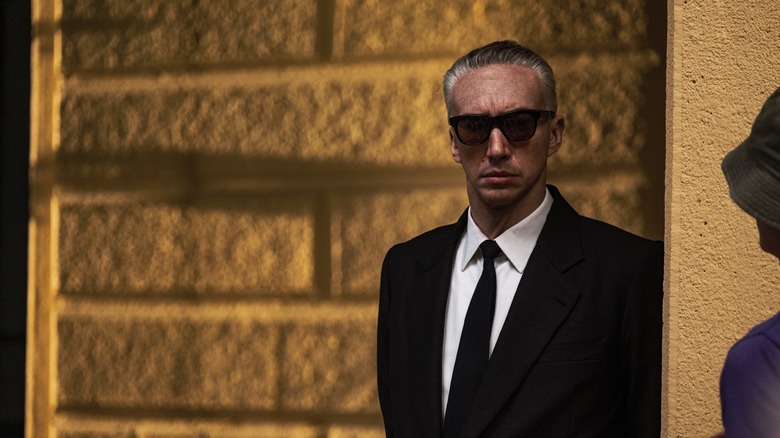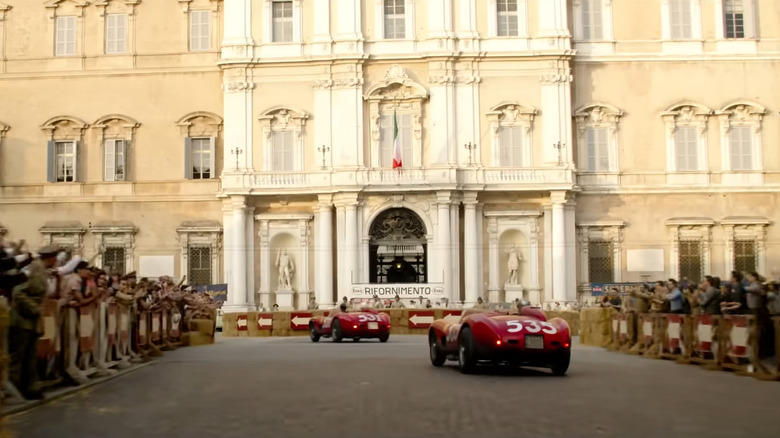Ferrari Review: Michael Mann Captures The Nervy High Drama Of Racing
Another year, another film where Adam Driver plays a major figure in modern Italian history. In "Ferrari," he takes on the role of Enzo Ferrari, father of one of the most prestigious car manufacturers in Italy, as he struggles to navigate an uncertain future for his company as well as difficulties in his personal relationships. Michael Mann brings his trademark ability to blend pathos and action to the film, equally adept at capturing the high drama of racing and the deeper emotional interpersonal complications. Driver offers a steely, commanding performance in the lead role, but it is Penelope Cruz's devastating performance as his wife Laura that walks away with the film.
Although we're shown glimpses of Enzo Ferrari (Adam Driver) during his younger racing days at the beginning of the film, the man that we meet is at a crossroads, seeing everything he holds dear threatened. His company is in dire financial straits — he's not selling enough cars to keep Ferrari in the red, and Maserati has stolen their record on the race track. His financial advisors are encouraging him to pursue a deal with one of the major car companies, a decision that Enzo is worried will result in him being stripped of control.
His personal life is no easier. His son Dino passed away the year earlier, and the grief felt by Enzo and his wife Laura (Penelope Cruz) has driven a wedge between their already fractured relationship. Meanwhile, Enzo's long-time mistress Lina (Shailene Woodley) is demanding some sort of resolution to the argument they've been having for over a decade: They share a son, Piero, who is about to be confirmed into the Catholic church, which makes Enzo's decision of whether or not to acknowledge him a matter of some urgency. Despite these concerns, Enzo shows few signs of cracking. He has the heart of a race-car driver, as he often says, and he faces each complication not with fear or anxiety, but with steely-eyed determination. He will save the company, come to some sort of an agreement with Lina, and make peace with Laura, because that's what he has to do.
An Italian love affair
Throughout these personal and professional crises, Driver plays Enzo as a man on a mission. He's not an inscrutable character — we see his emotions boil up to the surface time and time again, and we understand exactly why he's doing what he's doing — but he is self-possessed to an extreme degree. With each curve in the road, the cogs in his head are turning, carefully thinking through his next move. While he loves Lina and Laura deeply (albeit in different ways), their wants and needs will always come second to what's best for Enzo and the Ferrari brand. As Enzo, Driver builds an engaging performance that offers audiences a glimpse into his rich inner life.
Where Driver is measured and practical, Penelope Cruz as Laura is crackling with fire, an explosive mixture of rage, betrayal, and overwhelming grief. Although she fires a gun at Enzo in their first scene together, she is by far the most sympathetic character in the film, thanks to Cruz's emotionally stirring performance. We feel keenly her sense of injustice, especially at the revelation that Enzo has fathered a second son, while she remains a mother without a child. Compared to Cruz, it has to be said, Shailene Woodley as the other woman feels out of her depths. Miscast and with a distractingly shaky accent, it's hard to watch her and not think about all the other actresses who might have been able to pull something more complex from the character.
The drama of racing
But the private life of Enzo is only one piece of "Ferrari" — it goes hand-in-hand with his desperate bid to save the company by investing more heavily in their racing team and pinning all their hopes on them winning the grueling Mille Miglia, a 1000 mile race across Italy. This is where director Michael Mann takes his biggest artistic risks, creating a high-octane experience with deafening sound design that fully captures the high speed of these races and all the danger that goes along with it. We are reminded throughout the film that death is never far from a race-car driver; one miscalculated turn, a botched gear shift, an unexpected bump on the road, can all invite tragedy. Before each race, the drivers write a letter to their loved ones in case they crash, a grim reminder of the heavy price they must be willing to pay for love of the sport. For a man like Enzo, whose biggest life moments seem to have been colored by death — the loss of his older brother in the Great War, his son's passing, the building of the Ferrari factory from the bombed-out rubble of World War II, the many drivers in his employ who have died tragically — this is always on his mind.
Dodgy accents aside (and there are a few, although none rise quite to the camp level of Jared Leto in "House of Gucci"), "Ferrari" is a measured, thoughtful exploration of both the Ferrari family and its racing empire. Adam Driver is a steady presence at its center, spewing wry admonishments to his employees with aplomb all while grappling with complications in his personal life. Penelope Cruz steals the show with a heart-rending take on the scorned wife, one who is devastated by the turn her life has taken, but is also pragmatic and incredibly loyal to the business that she helped build. The connection that Driver and Cruz have on screen is tangible, carrying so much pain, history, and mutual respect in every scene. Although there's sometimes a disconnect between parts of the story that deal with Enzo's personal life and the frenetic racing scenes, they somehow work together in tandem, combining to create one of Michael Mann's most emotionally satisfying films in years.
/Film Rating: 8 out of 10


